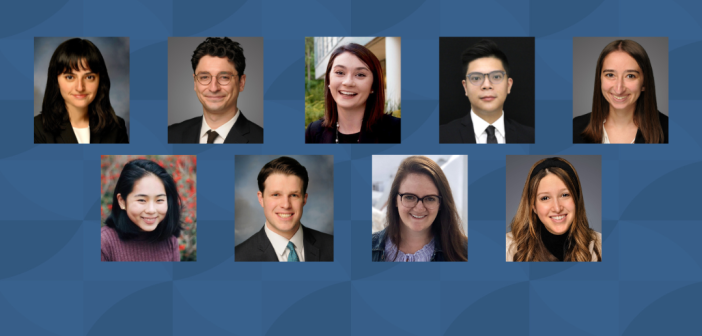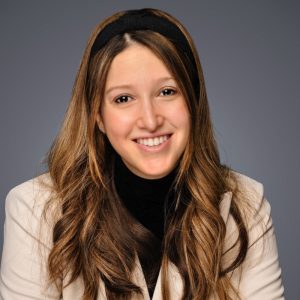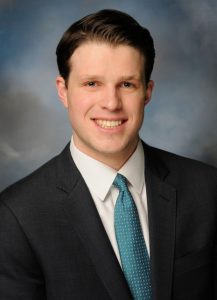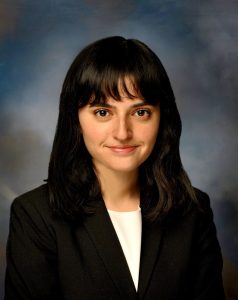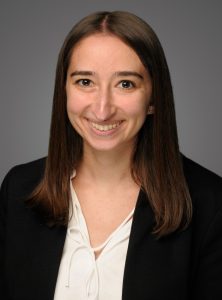The Center for Judicial Events & Clerkships (CJEC) has named its 2022–2023 Peer Clerkship Council (PCC), composed of nine members of the J.D. Class of 2023 who worked closely with the Center in securing their post-graduate judicial clerkships.
The Peer Clerkship Council initiative was launched by the CJEC in the 2020–2021 academic year to further the clerkship side of the Center’s mandate and to help foster a clerkships-oriented culture at Fordham Law School. The inaugural PCC laid the foundation for an enduring peer support initiative, which had an immediate clear impact through a vast array of initiatives. Last year’s PCC built upon the work of their predecessors, while making their own mark in helping the CJEC foster a broad and inclusive clerkship-oriented culture through their collaborative efforts.
“We have been incredibly fortunate to have such a dynamic cohort of students on our peer council each year,” said Assistant Dean Suzanne M. Endrizzi ’96. “This year’s group is equally enthusiastic and motivated to find innovative ways to interact with their peers, especially the incoming 1Ls.”
At the initial meeting the PCC identified key areas of focus, including:
- Engaging and supporting first-year J.D. students and serving as a peer resource to upper division J.D. students
- Developing initiatives to promote and assist students with building faculty relationships
- Creating DEI initiatives in collaboration with student organizations
- Building bridges with/to our alumni clerk community through participation in events
The PCC programs and initiatives will be posted on the CJEC’s LawNET page.
“We are pleased to have another dynamic group of students leading our peer engagement initiative,” said James J. Brudney, Joseph Crowley Chair in Labor and Employment and faculty director of CJEC. “I look forward to the PCC’s efforts, ensuring that the clerkship side of the CJEC continues to adapt to student needs and interests.”
Meet the 2022-23 Members of the Peer Clerkship Council
Nico Corti ’23
Hometown: Westlake Village, California
Education: B.A. in Political Science, Stanford University ’17
Clerkship: Judge Claire C. Cecchi ’89, U.S. District Court for the District of New Jersey, Late 2024 or early 2025
“I am the executive articles editor for the Fordham Law Review, an associate editor of the Dispute Resolution Society, a member of the Fordham Moot Court Board, and a former coach and competitor for the Fordham Sports Law Forum’s Baseball Arbitration Team.
“I pursued a clerkship to become a more effective legal writer and advocate. Clerking seems to provide a unique opportunity for new lawyers, under the close guidance of an experienced federal judge at the top of their field, to spend each day researching and writing about various areas of the law.
“I had a lot of questions and insecurities about the clerkship application process before going through it. The CJEC and the PCC were a great resource to me as I navigated this process and I hope I can be helpful to others as a PCC member this year.”
Luis del Rosario ’23
Hometown: Los Angeles, California / Manila, Philippines
Education: B.A. in International Relations, Economics, and French, Tufts University ’18
Clerkship: Senior Judge Denny Chin ’78, U.S. Court of Appeals for the Second Circuit, 2024–2025 Term
“I am editor-in-chief of the Fordham Law Review, an associate editor and former competitor for the Dispute Resolution Society, a member and former bench team member of the Moot Court Board, and a member of the Asian Pacific American Law Students Association.
“I thrive in roles where I am challenged both by exciting work and by inspiring mentors. I decided to pursue a clerkship because I knew that it would not only challenge me to untangle complex issues of law on the daily, but would also place me in a unique, one-on-one mentorship relationship with a judge. I’ve seen the impact that rigorous training and mentorship can have in a career, so I’m excited to experience that for myself.
“I would not be where I am today without the help of the CJEC and previous members of the PCC. Paying it forward is the least I could do!”
Rachel Ehrlich ’23
Hometown: Passaic, New Jersey
Education: B.S. in Biology, Touro College ’20
Clerkship: Judge Barbara J. Buono Stanton ’91, New Jersey Superior Court, Family Division, 2023–2024 Term
“I am an editorial board member of the Urban Law Journal, antidiscrimination & inclusivity editor of the Brendan Moore Trial Advocacy Team, member of the Jewish Law Students Association, and member of the Fordham Softball team.
“Judges defend justice and have the power to expand or restrict our rights. I believe that the opportunity to work so closely with a judge and see the inner workings of the chambers would be of use to me with whatever field of law I decided to pursue.
“I was on edge when applying for a clerkship due to the competitive process and nature of a clerkship. During my 1L year, PCC was a new initiative, and supportive professors encouraged me to apply. I am so happy I listened to those voices. I decided to become involved with PCC so that I can be that voice to fellow students and explain to them that they, too, can obtain a clerkship.”
Jacqueline Hayes ’23
Hometown: Little Rock, Arkansas
Education: B.A. in Political Science, Emory University ’18
Clerkship: Chief Judge Debra Brown; U.S. District Court for the Northern District of Mississippi, 2023–2024 Term
“I am the senior notes editor for the International Law Journal, interschool competition editor for the Brendan Moore Trial Advocacy Team, and Mulligan associate editor for Fordham Law Moot Court Board.
“I decided to pursue a clerkship due to my interest in prosecutorial work and litigation more generally.
“The clerkship process can be difficult and daunting to navigate. I truly could not have done the process without Fordham’s resources, and I want to contribute to those resources.”
Isaac Krier ’23
Hometown: Sherborn, Massachusetts
Education: B.A. in Political Science, Haverford College ’18
Clerkship: Senior Judge Paul J. Kelly, Jr., U.S. Court of Appeals for the Tenth Circuit, 2023–2024 Term
“I am an articles and notes editor and the associate online editor for the Fordham Law Review, as well as a member of the Fordham Law Moot Court Board. I was also a legal writing teaching assistant.
“My interest in clerking took shape after an externship at the [U.S. District Court for the] Southern District of New York during Spring 2022. I enjoyed tackling the thorny legal issues before the court, practicing my legal writing and research skills in real time, and observing trial action. I also learned a great deal from the judge and his excellent clerks, and enjoyed the intimate workplace environment of chambers. After this positive experience, I felt that a clerkship after law school would provide me with the most comprehensive training in legal writing, research, and how our legal system functions as I begin my career as a lawyer.
“I, like many others, felt intimidated at the beginning of my clerkship application process, given what I had heard about the competitive and selective nature of the applications. However, the CJEC was an invaluable resource in helping me prepare my application and consider the most viable options, and I also utilized PCC resources to prepare for my interview. I am excited to pay it forward by assisting the next crop of Fordham Law students applying for clerkships and to provide support during an often daunting experience.”
Juliet Liu ’23
Hometown: Syosset, New York
Education: M.A. in Teaching, Relay Graduate School of Education ’20; B.A. in Anthropology and History, Wellesley College ’17
Clerkship: Senior Judge Denny Chin ’78, U.S. Court of Appeals for the Second Circuit, 2023–2024 Term
“I am the executive notes editor of the Fordham Law Review and a member of the Asian Pacific American Law Students Association. During my 2L year, I was an advisor for the Board of Student Advisors and an academic success tutor.
“I did not come to law school knowing what a clerkship was, but I soon realized how everyone who has clerked considers it a highlight of their legal career. I decided to pursue a clerkship because I want to strengthen my legal writing and research skills and gain exposure to various areas of substantive and procedural law. Also, I think clerking is an invaluable and extraordinary opportunity to form a close, long-lasting mentorship relationship with a judge.
“Many things in law school are unfamiliar and intimidating, but I think the clerkship application process can feel especially daunting at the beginning. Everyone’s path to applying for and securing a clerkship is different, and the CJEC and PCC are extremely helpful in guiding you throughout the process. I wanted to pay it forward by sharing my experiences and advice to future applicants through participating in the PCC.”
Maya McGrath ’23
Hometown: St. Helena, California
Education: B.S. in Human Biology, University of Southern California ’20
Clerkship: Judge Claire Eagan ’76, U.S. District Court for the Northern District of Oklahoma, 2023–2024 Term
“I am the executive symposia editor of the Fordham Law Review, alumni editor of the Moot Court Board, member of the Brendan Moore Trial Advocacy Center, research assistant for Professor Courtney Cox and a teaching assistant for criminal law. I also competed in the Burton D. Wechsler National First Amendment Moot Court Competition during the fall of my 2L year.
“I pursued a clerkship to maximize my opportunities after law school and to give myself more time to decide what area of litigation I am most interested in. Additionally, I want to live and work in a different place where I can develop a more well-rounded understanding of the law.
“I decided to become involved with the PCC to pay it forward! I did not think I had the credentials to be a clerk, but Dean Endrizzi made me believe it was possible and she and Professor Capra helped me develop my candidacy. The PCC and the CJEC were an incredible resource and extremely helpful to me as I navigated the clerkship process, and I would like to similarly encourage students who felt the same way I did.”
Carleigh Stiehm ’23
Hometown: Nokesville, Virginia
Education: Duke University ’16
Clerkship: Judge Christine M. Vanek, Hudson County Superior Court, Civil Division, 2023–2024 Term
“I am a member of Moot Court, Fordham Environmental Law Review, and Decennial Fellow for the Center on Law and Information Policy.
“After working in a judge’s chambers for my 1L summer, I knew that I was interested in pursuing a clerkship. There seems to be no better way to understand the intricacies of civil procedure and the legal system than by helping support the bench.
“Before I began applying, I worried that I would not be qualified enough to be selected for a clerkship. The internal doubt was almost enough to dissuade me from applying at all. I want to work with the PCC to make sure that other students considering clerkships do not feel discouraged.”
Abigail Tubin ’23
Hometown: Tenafly, New Jersey
Education: B.A. in Politics and International Affairs, Wake Forest University ’19
Clerkship: Judge Cathy Seibel ’85, U.S. District Court for the Southern District of New York, 2024–2025 Term
“I am an articles and notes editor on the Fordham Law Review. During my 2L year, I was a 1L Civil Procedure tutor and a research assistant.
“I decided to pursue a clerkship after interning for Judge Claire Cecchi ’89, U.S. District Judge for the District of New Jersey, and working very closely with her clerks. I loved the experience of observing the litigation process from the perspective of a judge’s chambers. As an aspiring litigator, there is no better learning opportunity than researching and writing under the direction of a federal judge.
“I wanted to share my clerkship application experience in hopes of encouraging others to pursue the process. Dean Endrizzi and the CJEC as a whole were instrumental in guiding me through a process that can otherwise seem daunting. I hope to pay this forward and serve as a mentor for students who have the same questions as I did last year.”

